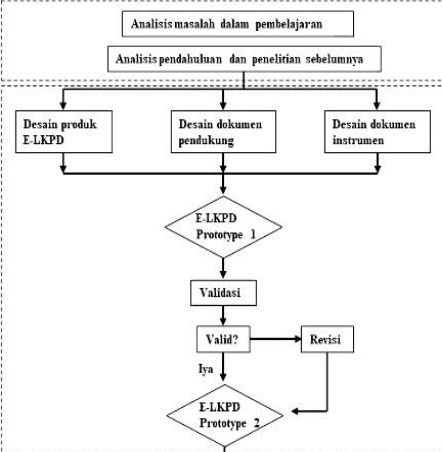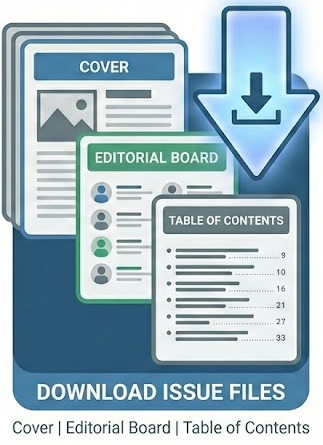Development and Validation of Google Sites Technology-Assisted Student Worksheet to Increase Students' Collaboration Skills in Science Learning in Junior High School
DOI:
https://doi.org/10.30736/seaj.v7i1.1144Keywords:
Collaboration Skills, Google Sites, Plomp.Abstract
Development and Validation of Google Sites Technology-Assisted Student Worksheet to Increase Students’ Collaboration Skills in Science Learning in Junior High School. This research is based on the problem of collaboration skills of students in class VIII F SMP Negeri 6 Jember which is still low in science learning conducted by observation. One way to overcome this is to develop E-LKPD assisted by Google Sites to improve students' collaboration skills. The purpose of the study was to examine the validity, practicality, and effectiveness of E-LKPD assisted by Google Sites to enhance student collaboration skills in science learning. The research design uses Research and Development (R&D) with the Plomp development model which includes preliminary research, prototyping stage, and evaluation stage. Products that have been developed, get a validation score of 94% with a very valid category. Practicality is 96.83% with a very practical category. The effectiveness of E-LKPD is 63% with the results of the N-gain test with a moderate category, 77% self-assessment with a high category in collaboration, and 88% student response questionnaire with a very good category. The results of this study can conclude that E-LKPD assisted by Google Sites can be said to be valid, practical, and effective in learning science in junior high school.
Downloads
References
Agustini, D., Lian, B., & Sari, A. P. (2020). School’s Strategy for Teacher’s Professionalism Through Digital Literacy in the Industrial Revolution 4.0. International Journal of Educational Review, 2(2), 160–173. https://doi.org/10.33369/ijer.v2i2.10967
Akker, J. Van Den. (2013). Educational Design Research Educational Design Research. In T. Plomp & N. Nieveen (Eds.), Educational Design Research. Ntherlands Institue for Curriculum Development (Slo). http://www.eric.ed.gov/Ericwebportal/Recorddetail?Accno=Ej815766
Asmaryadi, A. I., Darniyanti, Y., & Nur, N. (2022). Pengembangan Bahan Ajar e-LKPD Berbasis MIKiR dengan Mengunakan Live Worksheets pada Muatan IPA di Sekolah Dasar. Jurnal Basicedu, 6(4), 7377–7385. https://doi.org/10.31004/basicedu.v6i4.3521
Sitanggang, S.A., & Lubis, F. (2023). Pengembangan E-LKPD Interaktif Materi Teks Cerita Pendek Berbasis Website Wizer.me Kelas XI SMA Tahun Pembelajaran 2022/2023. Multiverse: Open Multidisciplinary Journal, 2(2), 162–172. https://doi.org/10.57251/multiverse.v2i2.1083
Crebert, G., C.J. Patrick, V. Cragnolini, C. Smith, K. Worsfold, dan F. W. (2011). Problem Solving Skills Toolkit.2nd ed. Queensland: Griffith University.
Derta, E., S. Nerita, & A. Maizeli. (2023). Validitas E-LKPD Interaktif Berbasis Discovery Learning Pada Materi Keanekaragaman Hayati Untuk Fase E SMA/MA. DIROSAT: Journal of Education, Social Sciences & Humanities, 1(2), 51–57. https://doi.org/10.58355/dirosat.v1i2.11
Fahrezi, N. (2022). Collaboration Model for Guidance and Counseling Teachers with Subject Teachers in Increasing Student Learning Motivation in Class XI MIA SMA Negeri 1 Painan. Holistic Science, 2(3), 178–184. https://doi.org/10.56495/hs.v2i3.214
Fitrah, A., Yantoro, Y., & Hayati, S. (2022). Strategi Guru dalam Pembelajaran Aktif Melalui Pendekatan Saintifik dalam Mewujudkan Pembelajaran Abad 21. Jurnal Basicedu, 6(2), 2943–2952. https://doi.org/10.31004/basicedu.v6i2.2511
Hake, R. R. (1998). Analyzing Change/ Gain Store. American Educational Research Methodology.
Jiwa, I. N. (2022). Cara Sukses Mengembangkan Bahan Ajar Berbasis Keterampilan Proses Sains dalam Pembelajaran Kimia. CV Bintang Semesta Media.
Jubaidah, S., & Zulkarnain, M. R. (2020). Penggunaan Google Sites Pada Pembelajaran Matematika Materi Pola Bilangan Smp Kelas VIII Smpn 1 Astambul. Jurnal Ilmiah Kependidikan, 15(2), 68–73.
Kartini, K. S., & Putra, I. N. T. A. (2020). Respon Siswa Terhadap Pengembangan Media Pembelajaran Interaktif Berbasis Android. Jurnal Pendidikan Kimia Indonesia, 4(1), 12. https://doi.org/10.23887/jpk.v4i1.24981
Mona, N., & Rachmawati, R. C. (2023). Penerapan Model Project Based Learning untuk Meningkatkan Keterampilan Kolaborasi dan Keterampilan Kreativitas Peserta Didik. Jurnal Pendidikan Guru Profesional, 1(2), 150–167. https://doi.org/10.26877/jpgp.v1i2.230
Novendra, A., Ramalis, T. R., & Arif, H. (2023). Pengembangan E-LKPD Berbasis Problem Based Learning Berpotensi Melatihkan Keterampilan Kolaborasi Siswa SMA pada Materi Gerak Harmonik Sederhana. Prosiding Seminar Nasional Fisika, 2, 34–42.
Nur Atmi Dwipoyanti, Supeno*, U. N. (2024). Development of Collaboration Script-Based Worksheets to Improve Collaborative Skills and Learning Outcomes in Junior High Schools Science Learning. Jurnal Ilmu Pendidikan (JIP) STKIP Kusuma Negara, 15(1), 209–222. http://scioteca.caf.com/bitstream/handle/123456789/1091/RED2017-Eng-8ene.pdf?sequence=12&isAllowed=y%0Ahttp://dx.doi.org/10.1016/j.regsciurbeco.2008.06.005%0Ahttps://www.researchgate.net/publication/305320484_SISTEM_PEMBETUNGAN_TERPUSAT_STRATEGI_MELESTARI
Octaviana, F., Wahyuni, D., & Supeno, S. (2022). Pengembangan E-LKPD untuk Meningkatkan Keterampilan Kolaborasi Siswa SMP pada Pembelajaran IPA. Edukatif : Jurnal Ilmu Pendidikan, 4(2), 2345–2353. https://doi.org/10.31004/edukatif.v4i2.2332
Oktaviani, R. N. (2022). Implementasi Model Pembelajaran Problem Based Learning (Pbl) Berbasis Lesson Study Untuk Meningkatkan Keterampilan Komunikasi Dan Kolaborasi Mahasiswa Pada Mata Kuliah Perencanaan Pembelajaran Di Sd. ELSE (Elementary School Education Journal) : Jurnal Pendidikan Dan Pembelajaran Sekolah Dasar, 6(2), 257. https://doi.org/10.30651/else.v6i2.11095
Purwati, N. K. R., I. W. Sumandya, & P. R. S. Putri. (2023). E-Lkpd Berbasis Etnomatematika Pada Materi Trigonometri. Proximal: Jurnal Penelitian Matematika Dan Pendidikan Matematika, 6(1), 164–172. https://doi.org/10.30605/proximal.v6i1.2122
Putri, D. A., Irianto, D. M., Furnamasari, Y. F., Indonesia, P., No, J. P., & Wetan, C. (2024). Pengembangan Media Pembelajaran Google Sites Berbasis Aplikasi pada Mata Pelajaran PPKn Materi Hak dan Kewajiban Kelas V Sekolah Dasar. Jurnal Pendidikan Tambusai, 8, 11381–11391. https://jptam.org/index.php/jptam/article/view/14091
Riduwan. (2013). Belajar Mudah Penelitian. Alfabeta.
Rizkika, M., Putra, P. D. A., & Ahmad, N. (2022). Pengembangan E-LKPD Berbasis STEM pada Materi Tekanan Zat untuk Meningkatkan Kemampuan Berpikir Kritis Siswa SMP. PSEJ (Pancasakti Science Education Journal), 7(1), 41–48. https://doi.org/10.24905/psej.v7i1.142
Rodliyah, U., & Fadly, W. (2023). Meningkatkan Kemampuan Kolaborasi melalui Model Guided Inquiry Berbasis Education for Sustainable Development pada Materi Biotik dan Abiotik. Jurnal Tadris IPA Indonesia, 3(2), 169–179. https://doi.org/10.21154/jtii.v3i2.2153
Rusmalinda, R., & Rahmadani, R. (2022). Keefektifan Model Discovery Learning Dengan Team Assisted Individualization (D-Tai) Terhadap Keterampilan Berpikir Kritis Peserta Didik Sma. Biolova, 3(2). https://doi.org/10.24127/biolova.v3i2.2528
Safitri. (2022). Pengembangan media bahan ajar E-Lkpd interaktif menggunakan website wizer.me pada pembelajaran Ips materi berbagai pekerjaan tema 4 kelas IV SDN tanah kalikedinding II. Mitra Mahajana: Jurnal Pengabdian Masyarakat, 4(1), 22–29.
Sagita, R., Fitriyah, D., & Yulita, I. (2024). Pengembangan Lembar Kerja Peserta Didik Elektronik (E-LKPD) Berbasis Komik Pada Materi Hidrokarbon. Jurnal Inovasi Pendidikan Kimia, 18(2), 157–162. http://repositori.umrah.ac.id/6637/%0Ahttp://repositori.umrah.ac.id/6637/4/RAFINA_SAGITA_180384204010_Pendidikan Kimia - Daftar Pustaka.pdf.pdf
Ulhusna, M., Putri, S. D., & Zakirman, Z. (2020). Permainan Ludo untuk Meningkatkan Keterampilan Kolaborasi Siswa dalam Pembelajaran Matematika. International Journal of Elementary Education, 4(2), 130. https://doi.org/10.23887/ijee.v4i2.23050
Wulandari, A. P., Salsabila, A. A., Cahyani, K., Nurazizah, T. S., & Ulfiah, Z. (2023). Pentingnya Media Pembelajaran dalam Proses Belajar Mengajar. Journal on Education, 5(2), 3928–3936. https://doi.org/10.31004/joe.v5i2.1074

Downloads
Published
How to Cite
Issue
Section
License
Copyright (c) 2025 Nurista Yuliatul Khumairoh, Ulin Nuha, Nur Ahmad

This work is licensed under a Creative Commons Attribution-ShareAlike 4.0 International License.
Authors who publish with this journal agree to the following terms:
- Authors retain copyright and grant the journal right of first publication with the work simultaneously licensed under a Creative Commons Attribution-ShareAlike 4.0 International License that allows others to share the work with an acknowledgment of the work's authorship and initial publication in this journal.
- Authors are able to enter into separate, additional contractual arrangements for the non-exclusive distribution of the journal's published version of the work (e.g., post it to an institutional repository or publish it in a book), with an acknowledgment of its initial publication in this journal.
- Authors are permitted and encouraged to post their work online (e.g., in institutional repositories or on their website) prior to and during the submission process, as it can lead to productive exchanges, as well as earlier and greater citation of published work (See The Effect of Open Access).

This work is licensed under a Creative Commons Attribution-ShareAlike 4.0 International License.








